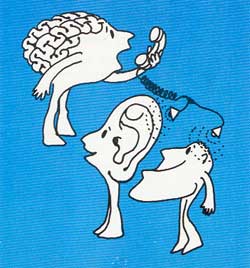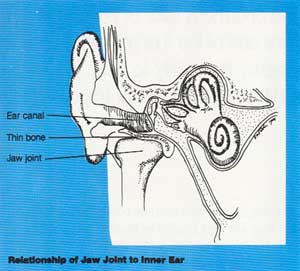 Sebo Marketing
Sebo Marketing
 October 15th, 2021
October 15th, 2021
Our ears are remarkable! Though animals have ears that range in size from the enormous ears of an elephant to the tiny ears of a mouse, they serve essentially the same function. Ears are one of the five primary sense organs responsible for hearing. For animals, hearing is key to survival. For humans, the ability to hear is what helps to keep us in touch with the world around us. A world of silence creates a difficult – though not impossible barrier to communication.
Most of us don’t think too much about our ears until something goes wrong. When that happens, it can be very disturbing. Ear related problems can cause a variety of symptoms and have a wide range of severity The physician who specializes in ears is commonly called the Ear, Nose and Throat special- ist (ENT for short)
What most people don’t realize is that the jaw is also closely related to the ears. Problems with your bite and with the muscles that control the jaw can actually affect your ears. Your bite may be the unsuspected culprit for these symptoms:Pain in the ears
How might you know if your ear problems have a dental origin? Dental related ear pain is usually felt in just one ear and feels very “deep.” It may travel down the neck, to the temple, or to the back of the head. It is usually aggravated by jaw movement. In addition to the above symptoms, other clues include:Sore / tender muscles around jaw joints
 How do the jaw and ears relate? For the developing embryo, the jaw and ear bones start out as one and the same. As the embryo grows, these bones separate. The tiny bones of the ears are the smallest bones in our body and appropriately named for their shape: the hammer (malleus), anvil (incus), and stirrup (stapes). The movement of the hammer is controlled by a muscle called the tensor tympani. This little muscle is responsible for controlling the vibrations of the ear drum and protects our inner ear from loud sounds.
How do the jaw and ears relate? For the developing embryo, the jaw and ear bones start out as one and the same. As the embryo grows, these bones separate. The tiny bones of the ears are the smallest bones in our body and appropriately named for their shape: the hammer (malleus), anvil (incus), and stirrup (stapes). The movement of the hammer is controlled by a muscle called the tensor tympani. This little muscle is responsible for controlling the vibrations of the ear drum and protects our inner ear from loud sounds.
Because the ears and the jaw were so closely related in our embryonic development, the nerve which controls the tensor tympani muscle happens to be the same nerve which controls our chewing muscles. Consequently, any signals sent through this nerve can affect both the muscles of the jaw joint and those of the ear – as if all these muscles shared the same phone line.
Not only are the ears and jaw connected by nerves, but they are also physically located very closely to one another. Your jaw is attached to your skull by two joints just in front of the ears. The part of your skull bone which separates your jaw joints from your ear canals is paper thin. Try placing both of your little fingers inside your ears and clenching your teeth. Most likely you can feel the movement of your jaw joints as you bite down. You can imagine that if these joints are displaced, they could disrupt the inner workings of your ear.
 We see then, that problems with the jaw can also affect the ears. What causes the chewing muscles to tense or the jaw joints to dislocate? The most common cause is a bad bite. What do we mean by a “bad bite?” We mean that your upper and lower teeth do not come together in a way to provide the proper bracing support for your jaw against your skull. The teeth must come together every time you swallow-over 2000 times each day and night! If your bite is unstable, as from poorly aligned teeth or even a missing tooth, the muscles must work harder to bring the teeth together. Eventually the chewing muscles tire out. They become shortened and stiff. Over time they may go into painful spasms. Muscle spasm is not only painful, but it can also cause your jaw joints to be pulled out of alignment.
We see then, that problems with the jaw can also affect the ears. What causes the chewing muscles to tense or the jaw joints to dislocate? The most common cause is a bad bite. What do we mean by a “bad bite?” We mean that your upper and lower teeth do not come together in a way to provide the proper bracing support for your jaw against your skull. The teeth must come together every time you swallow-over 2000 times each day and night! If your bite is unstable, as from poorly aligned teeth or even a missing tooth, the muscles must work harder to bring the teeth together. Eventually the chewing muscles tire out. They become shortened and stiff. Over time they may go into painful spasms. Muscle spasm is not only painful, but it can also cause your jaw joints to be pulled out of alignment.
If you have any of the symptoms described, contact your dentist. Your dentist will examine your bite and the muscles of the jaw to determine if this is the source of the problem. Dental treatment involves adjusting your bite so that the chewing muscles can function without extra strain and tension.
Do remember that these symptoms could be signs of a variety of ear problems. If you suffer from any of them, you should also get a thorough examinations from an ENT (Ear, Nose, Throat) physician.
Take time to understand your heath. Your health is your most priceless possession. It is worth the investment!
